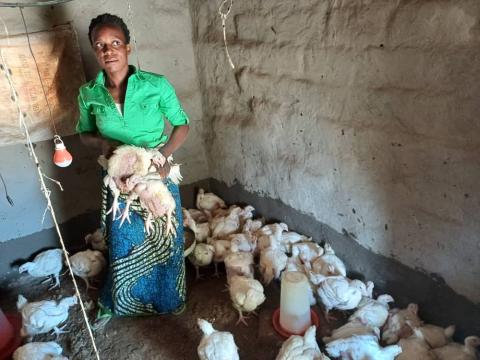How World Vision Zambia’s OCB Model is Equipping Community-Based Organisations

By Teddy Mofya, Development Facilitator CESP, Zambia
Through the Organizational Capacity Building (OCB) framework, World Vision Zambia has equipped local community-based organizations (CBOs) with essential tools to evaluate and enhance their operational capabilities, thereby facilitating socio-economic advancement and enabling them to more effectively advocate for child welfare.
The OCB framework is structured to empower organizations of varying sizes and developmental stages by promoting self-assessment across seven critical capacities. This reflective process enables entities to pinpoint deficiencies and formulate strategic capacity enhancement plans, culminating in improved operational efficiency and effectiveness.
A notable success of the framework is its capacity to assist Community-Based Organizations (CBOs) in fulfilling the rigorous criteria necessary for securing external financial resources, including the Constituency Development Fund (CDF) and funding from the Ministry of Youth and Sport.

Rita Mapala, Cluster Manager for World Vision Zambia, articulates with enthusiasm, "OCB serves as a conduit and an entry point for sustainable transformation for local community-based organizations and groups as they actively contribute to child welfare." Her statement encapsulates the fundamental nature of a program that is redefining the paradigm of community development in Zambia.
“We recognized that in order to genuinely support the children within our communities, it was imperative to first fortify our own institutional foundation,” asserts Nancy Zulu, the leader of one of the CBOs based in Chongwe. “With the guidance of World Vision, we undertook a comprehensive self-assessment and identified deficiencies in our governance, fiscal management, and project execution capabilities. The capacity enhancement plan functioned as our strategic roadmap to achievement.”
In the One Chongwe Cluster, the ramifications of this initiative are distinctly observable. Five CBOs, having engaged with the OCB process, have not only progressed in maturity but have effectively addressed their identified deficiencies. This advancement has facilitated access to external funding opportunities, including the Constituency Development Funds (CDF) and assistance from the Ministry of Youth and Sport.
The outcomes are profoundly motivating. Four of these organizations have initiated poultry farming enterprises, while an additional entity operates a hammer mill. These initiatives transcend mere economic activities; they represent vital resources for the communities. With a cumulative net worth approaching $4,000 in liquid assets and equipment, these CBOs are making a significant positive impact on the lives of 200 children from 80 households, alongside their guardians.
Andrew Mutelo, Ward Councilor from Bunda Bunda ward in Rufunsa district, conveys his appreciation: "We are grateful for your collaboration with the government on its developmental agenda by ensuring that the capacities of CBOs are fortified to promote growth within the Rufunsa community."
The efficacy of the OCB model resides in its holistic methodology. It enhances governance and leadership dynamics, augments financial management and accounting proficiencies, improves project management capabilities, and fosters the development of partnerships and networking. Furthermore, it equips CBOs with the competencies necessary to formulate proposals for external funding and successfully execute funded initiatives.
For the community members engaged in this initiative, it signifies more than mere organizational advancement. It embodies an opportunity to enhance their familial provisions, acquire critical skills, and contribute to the welfare of their children. The cascading effects of this empowerment resonate throughout the community, cultivating a sense of pride and self-sufficiency.
As World Vision Zambia persistently implements this initiative, the prospects appear optimistic for Chongwe and its surrounding areas. The OCB model transcends mere organizational development; it cultivates hope, fosters resilience, and establishes a trajectory towards sustainable development that originates at the grassroots level and aspires towards higher achievements.
According to a statement from a local participant, "We are not merely acquiring skills to manage businesses; we are actively engaged in shaping the future of our community." This perspective reverberates throughout Chongwe, serving as a testament to the transformative efficacy of empowering local organizations to spearhead their own developmental endeavours.